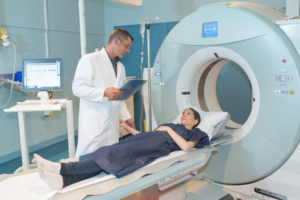 When your doctor orders an MRI Scan, they are looking for a clearer set of images of what is going on inside your body. MRI scans are also known as Magnetic Resonance Imaging and is a machine that uses powerful magnetic and radio waves to take highly detailed pictures of your internal structures. MRI scans are used to diagnose injuries and illnesses that affect bones, joints, muscles, organs, and other soft tissues inside the body. Unlike an X-ray or CT scan, this type of diagnostic imaging test does not use any radiation. There are many types of MRI scans, from the type of machine used to what the scan is looking for.
When your doctor orders an MRI Scan, they are looking for a clearer set of images of what is going on inside your body. MRI scans are also known as Magnetic Resonance Imaging and is a machine that uses powerful magnetic and radio waves to take highly detailed pictures of your internal structures. MRI scans are used to diagnose injuries and illnesses that affect bones, joints, muscles, organs, and other soft tissues inside the body. Unlike an X-ray or CT scan, this type of diagnostic imaging test does not use any radiation. There are many types of MRI scans, from the type of machine used to what the scan is looking for.
Open vs. Closed MRI Scans
The first thing you might want to know is whether you are having an open or closed MRI scan. MRI scans are typically depicted in television and movies as a closed tube-like machine where many characters experience stress or claustrophobia. While this type of test can feel more confining because of the shape of the machine, there are also open MRI machines. This type of MRI scan is recommended for people who suffer from claustrophobia or fear of small spaces. Whether or not you are in an open or closed MRI scan, you will also not be allowed to wear any metal, like jewelry or buttons and zippers on your clothes because the machine uses high-powered magnets.
What Is an MRI with Contrast?
So what should you expect when getting an MRI? In some instances, your doctor may request an MRI with contrast. This means you will be injected with what is called a contrast dye that helps improve the quality of the images taken. When a contrast dye is injected, it can enhance the visibility of certain illnesses or injuries, like tumors, blood vessels, and blood supply to specific areas of interest. An MRI with contrast may also be used to track the progression of certain degenerative diseases and illnesses, like multiple sclerosis and cancer.
Three Types of MRI Scans
There are actually many types of MRI scans that assess various parts of the body in great detail. Here are three examples of MRI scans and what they look for:
Functional MRI
A functional MRI, also known as an fMRI, assesses your brain activity and blood flow to the brain. This type of MRI is also used to view how specific parts of your brain activate when you perform certain tasks or functions. Your doctor may order a functional MRI if they suspect a brain injury and want to run further tests for more information. Functional MRIs are also common with degenerative diseases like dementia and Alzheimer’s. A doctor may also recommend a functional MRI if you are about to undergo surgery to rule out any tumors or risk of epilepsy during the procedure.
Cardiac MRI
Your doctor may order a cardiac MRI for a more detailed look at your heart and how it is functioning. A cardiac MRI provides your doctor with highly detailed images of your heart structure, blood vessels, and circulatory system. Common reasons why your doctor may schedule you for a cardiac MRI include detecting problems with the heart structure, like blockages to blood vessels or arterial issues. If you have suffered from a heart attack then your doctor may order a cardiac MRI to assess the damage to the structure of your heart and its functioning. Cardiac MRIs are also used to detect tumors that may be present in or around the heart and compromising your circulatory system.
Musculoskeletal MRI
A musculoskeletal MRI is commonly used to assess illnesses and injuries to your bones, joints, muscles, ligaments, and other soft tissues. An orthopedic doctor may request a musculoskeletal MRI if you suffered a car accident injury or suffered other injuries that may have damaged your internal organs or musculoskeletal system. While X-rays are commonly associated with scanning for broken bones, MRIs can detect hairline fractures that can be difficult to spot on an X-ray. A musculoskeletal MRI may also be recommended to evaluate joint and cartilage damage due to an injury like a torn ligament, or due to an issue like arthritis.
The team of multi-specialty doctors at AICA Orthopedics has access to these types of state-of-the-art diagnostic imaging tools in-house, which means you can meet with your doctor and go for an MRI all in one convenient location. Visit AICA Orthopedics in Marietta and find out more about why an MRI scan may be right for you.